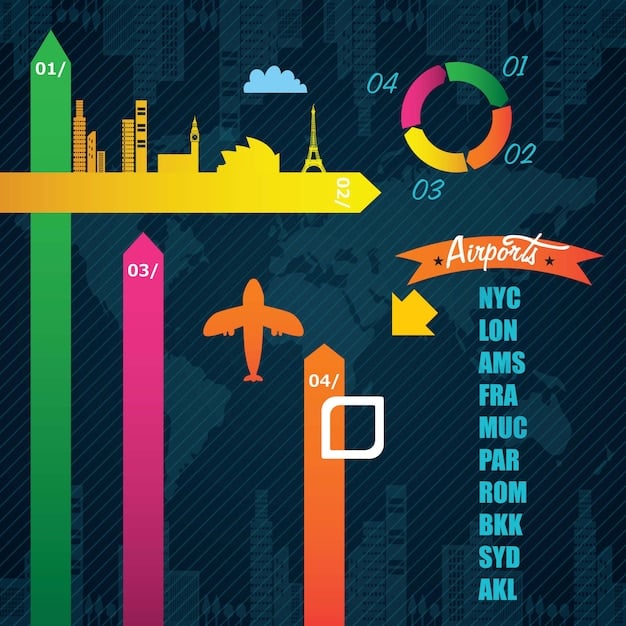US Immigration Policy: Analyzing its Impact on Geopolitical Stability

Analyzing the Impact of US Immigration Policy on Geopolitical Stability reveals a complex interplay between domestic regulations and international relations, affecting economic alliances, security concerns, and humanitarian obligations.
The United States’ immigration policies have far-reaching implications that extend beyond its borders. This article delves into analyzing the impact of US immigration policy on geopolitical stability, exploring the multifaceted ways in which these policies influence international relations.
Understanding US Immigration Policy
US immigration policy is a constantly evolving framework that governs the entry, residency, and naturalization of foreign nationals. It encompasses a wide range of laws, regulations, and procedures that are shaped by economic, social, and political considerations.
Historical Context of Immigration Policies
The history of US immigration policy is marked by periods of openness and restriction. Early policies encouraged immigration to populate the country and fuel economic growth, but later laws introduced quotas and preferences based on national origin.
- The Immigration Act of 1924 established quotas that favored immigrants from Northern and Western Europe, while severely limiting immigration from other parts of the world.
- The Immigration and Nationality Act of 1965 eliminated national origin quotas and prioritized family reunification and skilled workers.
- More recent policies have focused on border security and enforcement, particularly in response to concerns about terrorism and unauthorized immigration.

Current Key Components of US Immigration Policy
Today’s US immigration policy is characterized by several key components, including border security, enforcement, and pathways to legal status. These components shape who can enter the country, how they can stay, and what rights they have.
- Border security measures aim to prevent unauthorized entry by increasing surveillance, deploying personnel, and constructing physical barriers.
- Enforcement efforts target both unauthorized immigrants within the US and employers who hire them.
- Pathways to legal status include family-based visas, employment-based visas, and asylum for those fleeing persecution.
Understanding these key components is crucial for analyzing the impact of US immigration policy on geopolitical stability, as they influence the flow of people, goods, and ideas across borders.
The Economic Impact on Geopolitical Stability
Immigration policies significantly affect the economic dynamics within the US and globally. The influx of skilled and unskilled labor impacts various sectors, influencing trade relationships and economic stability.
Labor Market Dynamics
Immigration influences the supply and demand of labor in the US. Immigrants often fill jobs that native-born workers are unwilling or unable to do, contributing to economic growth and innovation.
However, concerns persist about the potential for wage depression and displacement of native-born workers in certain sectors.
Trade and Investment
Immigration policies can impact trade and investment flows between the US and other countries. Restrictive policies may discourage foreign investors and reduce the availability of skilled workers, hindering economic competitiveness.

- Immigrants contribute to innovation by starting businesses and introducing new ideas and technologies.
- They also contribute to consumer demand by purchasing goods and services, supporting economic growth.
- Remittances sent by immigrants to their home countries can also have a significant impact on the economies of those countries.
In conclusion, the flow of immigrants influences labor markets, trade, and investment, all of which are vital components in analyzing the impact of US immigration policy on geopolitical stability.
Security Implications of Immigration Laws
Immigration policies play a critical role in national security, influencing border control, counter-terrorism efforts, and international cooperation in security matters.
Border Control and National Security
Stringent border control measures are often implemented to prevent the entry of individuals who pose a threat to national security, such as terrorists and criminals. However, they can also create unintended consequences that undermine security efforts.
For instance, restrictive policies may drive unauthorized immigration underground, making it more difficult to monitor and control.
Counter-Terrorism and Immigration
Immigration policies are often shaped by concerns about terrorism. Efforts to screen and vet immigrants are intended to prevent individuals with ties to terrorist organizations from entering the country.
However, these policies can also be discriminatory and alienate immigrant communities, making it more difficult to gather intelligence and build trust.
The interplay between security measures and analyzing the impact of US immigration policy on geopolitical stability requires a balanced approach to ensure both safety and cooperation.
Humanitarian and Ethical Considerations
Immigration policies raise significant humanitarian and ethical concerns, particularly regarding the treatment of asylum seekers, refugees, and vulnerable populations.
Asylum Seekers and Refugees
International law and domestic policy provide protections for individuals fleeing persecution and seeking asylum in the US. However, recent policies have restricted access to asylum and increased the risk of deportation for asylum seekers.
These policies have been criticized by human rights organizations for violating international norms and principles.
Treatment of Vulnerable Populations
Immigration policies affect vulnerable populations, such as unaccompanied minors, victims of trafficking, and individuals with medical conditions. These populations often face unique challenges and require special protections.
- Detention policies can have a particularly harmful impact on vulnerable populations, leading to physical and psychological trauma.
- Family separation policies can also have devastating consequences for children and parents.
- The ethical implications of these policies must be considered when analyzing the impact of US immigration policy on geopolitical stability.
Diplomatic Relations and Alliances
US immigration policy impacts diplomatic relations with other countries, influencing alliances, trade agreements, and international cooperation on migration issues.
Impact on Bilateral Relations
Immigration policies can strain bilateral relations between the US and other countries, particularly when they are perceived as discriminatory or unfair. For example, travel bans targeting citizens of certain countries have led to protests and diplomatic rebukes.
These policies can undermine trust and cooperation between countries, making it more difficult to address shared challenges.
Role in International Agreements
The US’s approach to immigration influences its participation in international agreements and initiatives related to migration and refugee protection. Restrictive policies may undermine the US’s credibility as a leader in these areas.
- The Global Compact for Safe, Orderly and Regular Migration is an example of an international agreement that the US has declined to endorse, citing concerns about national sovereignty.
- This decision has been criticized by other countries and international organizations as a setback for global cooperation on migration issues.
Understanding these relations helps in analyzing the impact of US immigration policy on geopolitical stability.
Future Trends and Policy Recommendations
Looking ahead, several trends and policy recommendations could shape the future of US immigration policy and its impact on geopolitical stability.
Anticipated Policy Shifts
Changes in political leadership and public opinion could lead to significant shifts in US immigration policy. For example, a change in administration could result in a reversal of restrictive policies and a renewed focus on comprehensive immigration reform.
The upcoming elections and ongoing debates about immigration reform suggest that the future of US immigration policy remains uncertain.
Potential Long-Term Effects
Long-term effects of immigration policies include demographic shifts, economic changes, and social integration challenges. These effects can have significant implications for the US’s role in the world.
- A growing immigrant population could lead to increased diversity and cultural exchange, but also to increased social tensions and challenges related to integration.
- Changes in the labor market could affect economic competitiveness and innovation.
By considering these trends, we can better continue analyzing the impact of US immigration policy on geopolitical stability.
| Key Aspect | Brief Description |
|---|---|
| 🛂 Border Security | Measures to control and monitor entry points, affecting trade and diplomatic relations. |
| 💼 Economic Impact | Influence on labor markets, innovation, and economic growth. |
| 🤝 Diplomatic Ties | Effects on bilateral relations, international agreements, and cooperation on global issues. |
| 🛡️ National Security | Impact on border control, counter-terrorism, and international security efforts. |
Frequently Asked Questions
▼
Immigration policies affect the supply and demand for labor, influencing wages and employment rates. Immigrants often fill jobs that native-born workers are unwilling to do.
▼
Immigration laws play a crucial role in national security by influencing border control, counter-terrorism efforts, and international cooperation on security matters.
▼
US immigration policy can strain bilateral relations with other countries, particularly when policies are perceived as discriminatory or unfair, undermining trust and cooperation.
▼
Immigration policies raise significant humanitarian concerns, especially regarding the treatment of asylum seekers, refugees, and vulnerable populations, requiring special protections.
▼
Changes in political leadership and public opinion, coupled with demographic shifts and economic changes, could lead to fundamental shifts in US immigration policy.
Conclusion
In conclusion, analyzing the impact of US immigration policy on geopolitical stability reveals a complex web of economic, security, humanitarian, and diplomatic considerations. Understanding these interconnected dynamics is crucial for policymakers and citizens seeking to navigate the challenges and opportunities presented by immigration in the 21st century.





